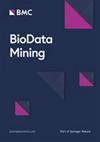数据科学学术领袖的十大重要角色。
IF 4
3区 生物学
Q1 MATHEMATICAL & COMPUTATIONAL BIOLOGY
引用次数: 0
摘要
数据科学已经成为大数据时代和生物医学数据挖掘时代的一门重要学科。因此,我们看到数据科学部门、研究中心和学校的数量迅速增加。我们在这里回顾了成功的学术数据科学主席、主任或院长的十个重要领导角色。这些角色包括梦想家、执行者、啦啦队长、经理、执行者、下属、教育者、企业家、导师和沟通者。每个角色都给出了具体到数据科学领导的例子。本文章由计算机程序翻译,如有差异,请以英文原文为准。
Ten important roles for academic leaders in data science.
Data science has emerged as an important discipline in the era of big data and biological and biomedical data mining. As such, we have seen a rapid increase in the number of data science departments, research centers, and schools. We review here ten important leadership roles for a successful academic data science chair, director, or dean. These roles include the visionary, executive, cheerleader, manager, enforcer, subordinate, educator, entrepreneur, mentor, and communicator. Examples specific to leadership in data science are given for each role.
求助全文
通过发布文献求助,成功后即可免费获取论文全文。
去求助
来源期刊

Biodata Mining
MATHEMATICAL & COMPUTATIONAL BIOLOGY-
CiteScore
7.90
自引率
0.00%
发文量
28
审稿时长
23 weeks
期刊介绍:
BioData Mining is an open access, open peer-reviewed journal encompassing research on all aspects of data mining applied to high-dimensional biological and biomedical data, focusing on computational aspects of knowledge discovery from large-scale genetic, transcriptomic, genomic, proteomic, and metabolomic data.
Topical areas include, but are not limited to:
-Development, evaluation, and application of novel data mining and machine learning algorithms.
-Adaptation, evaluation, and application of traditional data mining and machine learning algorithms.
-Open-source software for the application of data mining and machine learning algorithms.
-Design, development and integration of databases, software and web services for the storage, management, retrieval, and analysis of data from large scale studies.
-Pre-processing, post-processing, modeling, and interpretation of data mining and machine learning results for biological interpretation and knowledge discovery.
 求助内容:
求助内容: 应助结果提醒方式:
应助结果提醒方式:


